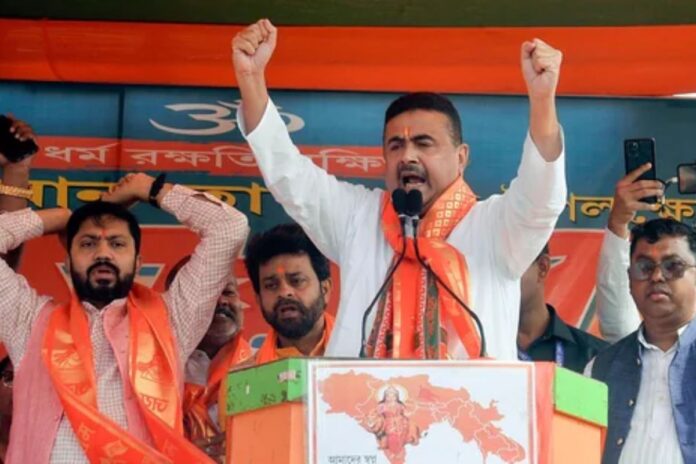
Bharatiya Janata Party (BJP) leader and Leader of Opposition in West Bengal, Suvendu Adhikari, issued a sharp warning to Bangladesh amid concerns over the alleged persecution of religious minorities, particularly Hindus, in the neighbouring country. Addressing a protest organised by the BJP and Hindu organisations at Ghojadanga, near the Bangladesh border in Basirhat, North 24 Parganas, Adhikari stated that two Rafale fighter jets stationed at Hasimara would suffice to “do the job” if needed.
Adhikari accused the Bangladeshi government of being “extremist, radical, and anti-human,” drawing comparisons with the Taliban. He also criticised the current state of affairs in Bangladesh, alleging that the country’s dependence on India is significant. “We don’t depend on Bangladesh. Bangladesh depends on us. If we stop sending 97 products, they will not get rice and clothes. If we halt electricity supply from Jharkhand, 80% of their villages will remain dark,” Adhikari asserted, as quoted by The Indian Express.
The protests were part of a broader wave of demonstrations across India condemning the recent violence against minorities in Bangladesh. Following the ousting of Prime Minister Sheikh Hasina, reports of violence, vandalization of temples, and attacks on Hindus have escalated. Adhikari announced plans for a large-scale meeting on December 16 to further address the issue and urged an end to the atrocities.
Bangladesh confirmed 88 incidents of communal violence against minorities and reported the arrest of over 70 individuals in connection with these acts. The revelation followed a meeting between Indian Foreign Secretary Vikram Misri and Bangladeshi officials, during which concerns regarding the safety of minorities were raised.
The violence against Hindus and other minorities has heightened tensions between the two nations, with New Delhi expressing strong concern. Attacks on temples and religious sites have added to the growing unrest. Adhikari’s comments, particularly his reference to Rafale jets, reflect escalating rhetoric amid calls for immediate action to protect minority communities in Bangladesh.
While Bangladesh has taken steps to address the violence, the situation remains under scrutiny, with Indian leaders closely monitoring developments. Protests like those in Basirhat highlight the growing dissatisfaction and demand for accountability over the treatment of minorities in the region.
